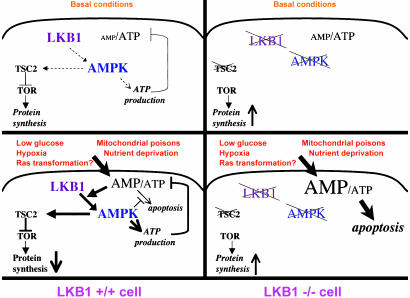Fig. 6.
Model for LKB1 as a sensor of low energy and negative regulator of tumorigenesis and apoptosis. Under basal conditions, LKB1 serves as a sensor of low energy, keeping ATP-consuming processes including protein synthesis in check via AMPK phosphorylation of TSC2. In response to stresses such as low glucose, hypoxia, nutrient deprivation, or mitochondrial poisons, LKB1 phosphorylates AMPK, which shuts off ATP-consuming processes and up-regulates ATP production to offset the elevated AMP/ATP ratio. This activity prevents the cells from going into apoptosis in response to elevated AMP. In LKB1-deficient cells, under some basal conditions, there may be increases in TOR signaling due to the lack of TSC2 phosphorylation by AMPK, resulting in increased growth or tumorigenic potential. In response to further increases in intracellular AMP, these cells have no mechanism to offset the elevated AMP and go straight into apoptosis.

